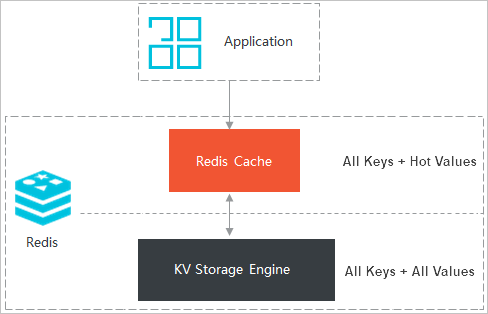Different from Redis Open-Source Edition instances, Tair hybrid-storage instances store data in both memory and disks. Hybrid-storage instances offer the benefits of both memory and disks to support data persistence and high read and write performance at the same time.
Hybrid-storage instances are retired. For more information, see End-of-sale for Tair hybrid-storage instances. We recommend that you choose persistent memory-optimized instances.
Overview
Figure 1. Hybrid-storage instance architecture 
Hybrid-storage instances of Tair are developed by Alibaba Cloud and are compatible with the Redis protocol. These instances store all data in disks and hot data in memory to ensure high read and write performance. Hybrid-storage instances deliver a cost-effective solution that supports high-performance queries for frequently accessed data without the limit of memory capacity.
In-memory storage: Keys and values of hot data are stored in memory. The information of all keys is also cached in memory. This way, you can check whether a specified key exists in a fast and convenient manner.
Disk storage: All keys and values are stored in disks. Redis data structures such as hashes are also stored in disks in a specific format.
Scenarios
Scenario | Description |
Livestreaming | Livestreams generate large amounts of hot data. Most of the data comes from popular live channels. You can use hybrid-storage instances to store data from popular live channels in memory and data from less popular live channels in disks. This allows you to make full use of the limited memory capacity. |
E-commerce | E-commerce applications need to access large amounts of commodity data. You can use hybrid-storage instances to store data and optimize memory usage. The data of popular commodities is stored in memory, and the data of less popular commodities is stored in disks. |
Online education | Online education applications need to access large amounts of data. Such data includes online courses, question libraries, and messages between teachers and students. Only popular courses and the latest question libraries are frequently accessed. You can use hybrid-storage instances to store the data of online courses in disks, and store the data of popular courses and question libraries in memory. Tair provides a cost-effective solution to ensure high read and write performance for frequently accessed data. |
The following examples show the benefits of hybrid-storage instances:
Example 1: A native Redis cluster is used to store 100 GB of data. The number of queries per second (QPS) at peak hours is less than 20,000, and 80% of the data is not frequently accessed.
In this case, you can use a hybrid-storage instance that has 32 GB memory and 128 GB storage capacity. This saves about 70 GB of memory resources and reduces storage costs by more than 50%.
Example 2: An on-premises Pika instance is used to reduce the storage costs of a native Redis deployment. The total size of the data is about 400 GB, and only about 10% of the data is frequently accessed. In addition, high costs are incurred for cluster O&M.
In this case, you can use a hybrid-storage instance that has 64 GB memory and 512 GB storage capacity. This reduces your O&M costs and ensures high availability.